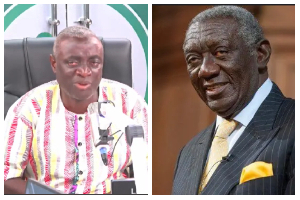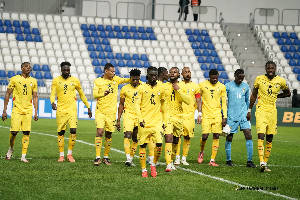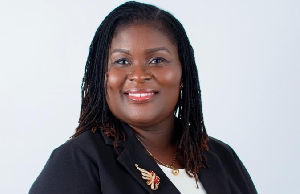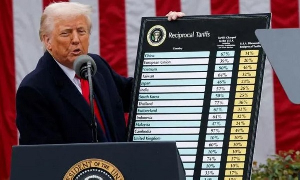A Ghana News Agency Feature By Boakye-Dankwa Boadi
Accra, July 19, GNA - Every morning's mathematics class at the Asem Local Authority Primary School in Kumasi in the 1960s started with mental arithmetic while the afternoon English Language class began with dictation.
The teacher would start by asking "3 X 3 + 4 - 2 3D " and the pupil was expected to say "11" in a matter of three seconds or else the cane would descend onto the palm.
It was, therefore, reminiscent when the Senior Minister, Mr Joseph Henry Mensah at the Press Conference on the Highly Indebted Poor Countries (HPIC) Initiative Completion Point on Friday asked Journalists to do the arithmetic of the benefit of HIPC, which he said was 280 million dollars savings a year for a period of 20 years.
Since this writer had been trained to give such answers in a matter of seconds it was not difficult using shortcut to arrive at the answer. It was simply 28 X 2 3D 56 plus eight zeros and that gives 5.6 billion dollars and at the current exchange of rate of approximately 9,000 cedis to the dollar one had no difficulty in arriving at the 50.4 trillion cedis.
This sum reminded this writer about the complaint Former President Jerry John Rawlings made when the New Patriotic Party (NPP) Government took over power and started saying that the National Democratic Congress (NDC) had left a debt of trillion of cedis.
The Former President was complaining about the quantum of debt, which the NPP had alleged that the NDC left behind and which he mentioned in Twi. He said: "They have been lying by telling the people that we left a debt of 'pe, pe, pe, pe, pem' cedis or what have you!"
Fortunately this time around when the 'pe, pe, pe, pe, pem' cedis was mentioned on the Twi-Speaking Radio Stations it was not in connection with debts but rather a windfall for the beloved Country - Ghana.
HISTORY OF GHANA OPTING FOR HIPC
The Minister of Finance and Economic Planning, Mr Yaw Osafo-Maafo recalled, "that in March 2001, the NPP Government under the able leadership of His Excellency, President J.A. Kufuor took a bold decision to seek debt relief under the Enhanced Heavily Indebted and Poor Countries (HIPC) initiative. "I am happy that this forum presents another opportunity to highlight what necessitated Government's decision to seek debt relief under the Enhanced HIPC initiative, the benefits it has reaped, and the challenges we have faced during this period.
"Since the debt crisis in the 1980s, the international financial community has been providing help to debtor countries to reduce their external debt burdens, in order to foster economic growth and development, reduce poverty and above all attain debt sustainability. This assistance, by way of debt relief has evolved over the period.
However, many poor countries, especially those in sub-Saharan Africa, continued to suffer from unfavourable terms of trade and worsening economic conditions, leading to unacceptable levels of poverty and huge and unsustainable external debt burdens.
"It was against this background that the World Bank and the IMF in September 1996 jointly launched the Initiative for Heavily Indebted Poor Countries (HIPC), aimed at reducing the external debt burdens of qualified and eligible countries to a sustainable level within a specified period of time. Subsequently, the Enhanced HIPC was approved in 1999, with the view to providing more debt relief for the implementation of comprehensive country specific poverty reduction strategy programmes.
"Who Qualifies for HIPC Debt Relief Initiative (Eligible country) "Eligibility is limited to countries;
"1. that can only borrow from the International Development Association (IDA) and access funds from the IMF under Poverty Reduction and Growth Facility (PRGF).
"2. with per capita GDP below US$700. Ghana's per capita GDP in 2001 was only US$300, which implies that by international standards Ghana is a low-income country.
"3. with established good track record of performance under programmes supported by the IMF and the World Bank, including a Poverty Reduction Strategy Paper. It does not require additional conditionalities aside what has been negotiated with the IMF.
4. willing to conduct a tripartite Debt Sustainability Analysis with the IMF and the World Bank to determine sustainability levels, timing and amount of relief to be obtained by the HIPC country
THE STATE OF THE ECONOMY ON THE EVE OF GOING HIPC
"Ladies and Gentlemen: You will recall that in the year 2000 the economy was in dire straits. An excessive fiscal expansion in the run-up to the Presidential and interminable Parliamentary elections had drawn it into a vicious cycle of spiralling inflation and currency depreciation, coinciding with sharp deterioration in commodity terms of trade. In the short span of one year ending December 2000, the national currency, the cedi, virtually collapsed, losing about 50 percent of its value vis-=E0-vis the US dollar.
"In January 2001, when the NPP administration assumed the reigns of government, the country's reserves were so depleted that it could hardly cover a month's imports while external payments arrears were built up. This was indeed a precarious situation, which posed imminent danger to the nation.
"Headline inflation was running at about 41 per cent; the fiscal deficit had increased from some 6.0 per cent of GDP in 1999 to 9.0 percent of GDP; the external public debt stood at 131.0 percent of GDP, and the domestic public debt at 35 percent of GDP, and was in a snowball.
"For the year 1999 and 2000, statutory servicing of external and domestic debt accounted for 32 percent and 39 percent respectively of total government expenditure. External debt servicing alone accounted for 24 percent of total government expenditure in 2000. A major consequence of this debt overhang was not only a stifled economic growth, but also a reduction in social and poverty related spending. "For example, the external debt service expenditure of 2,454.6 billion cedis was far bigger than the budgeted social services sector allocation of 1,370.1 billion cedis for the year 2000.
"At end 2000, a Debt Sustainability Analysis (DSA) was conducted which showed clear indications that our external debt servicing was unsustainable. The ratio of present value of Ghana's external debt stock to its domestic budget revenue was 571 percent. This was far in excess of the 250 percent threshold considered as a sustainable debt level.
"Ladies and gentlemen, in the light of the foregoing, there was an urgent need to take prudent economic decision and implement policies that would:
"* Reduce the external debt service burden on our foreign exchange earnings.
* Reduce our debts to sustainable repayment levels
* Improve our reserves and Balance of Payments position
* Free up more resources from domestic revenue to support socio-economic programmes
* Bring down the inflation rate, and hence nominal rates and interest rates
* Strengthen public expenditure management and control;
* Support and promote an ambitious divestiture strategy to increase the role of the private sector in economic activities.
"In the circumstances, the enhanced HIPC initiative was the obvious choice available to the Government to meet the above objectives, offering significant relief from a rather precarious debt situation. Although, it appeared to be an unpleasant decision then, it was the most immediate and prudent alternative for Government.
"Ghana's Decision to Join HIPC
"On the 9th of March, 2001, when the Minister of Finance was presenting his first budget of H.E. President Kufuor's administration, it was announced amidst hooting and yelling from the floor of the House that Ghana had decided to take advantage of the HIPC initiative.
WHAT IS HIPC?
"As you are by now aware, the HIPC initiative involves different stages as follows:"The first stage: This stage begins from the point when the country receives the Naples Terms debt relief treatment (usually 67 percent debt service relief) from the Paris Club Creditors, along with comparable treatment from other bilateral and commercial creditors. During this stage, the country should be on track with IMF and World Bank programmes. It ends with a country reaching the Decision Point. Ghana, by virtue of prudent economic management reached the Decision Point in February 2002, a year after opting for the HIPC Initiative.
"Decision Point is the point at which the IMF and World Bank determine the eligibility for the HIPC debt relief initiative and the quantum of debt relief required for a country's debt to be sustainable. "Interim Period: The second stage is the interim Period. This is the period between Decision Point and Completion point. During this period, we receive relief by way of reduced debt service from multilateral institutions, mainly, World Bank, IMF, African Development Bank and European Union. Paris Club creditor countries also provide relief on Cologne terms in valuing 90 percent cancellation of maturities (principal and interest) falling due within the interim period for commercial loans, and 100 per cent rescheduling of concessionary loans repayment (principal and interest) falling due within that same period).
It is worthy to note that some countries such as UK, USA, Netherlands, Germany, Italy, Canada, Norway provided up to 100 per cent cancellation of the payments falling due within the interim period. Also China during the period cancelled some loans extended to Ghana. "During the interim period Government is required to implement certain policy triggers, including a full year implementation of the Ghana Poverty Reduction Strategy. Successful implementation of these triggers and policies agreed with the IMF under the Poverty Reduction and Growth Facility to put the economy on a sound footing enables a country to reach Completion Point.
"Third Stage - Completion Point
"The third stage is the attainment of the Completion point (CP).
This is the stage at which the eligible country is approved by the Boards of IMF and the World Bank of having satisfactorily met the triggers set for the floating completion point. Due to the floating nature of the completion point, there is no well-defined time frame to get there. The triggers to completion point among others include:
"* Preparation of a full Poverty Reduction Strategy programme (PRSP) and satisfactory implementation for at least one year, as evidenced by joint staff assessment of the country's annual progress report and;
* Continued macro-economic stability as evidenced by the satisfactory implementation of the Poverty Reduction Growth Facility (PRGF) - supported programme.
"As I speak now, we aided by your invaluable efforts and sacrifices, have substantially satisfied all the requirement necessary to reach completion point.
BENEFITS OF HIPC
"At completion point, all creditors irrevocably commit to deliver debt relief."The Paris Club creditors provide at least 90 percent debt stock cancellation on cut-off-date loans (pre-cut-off date loans are loans signed before June 20, 1999) and in some cases part of post cut-off date loans (loans signed after June 20, 1999). Non Paris Club creditor countries and commercial creditors also provide comparable treatment. By comparable treatment, it implies that this group of creditors also provide similar debt relief as offered by the Paris Club creditor countries.
"Further all multilateral creditors such as the International Development Association and the IMF and African Development Bank will also have to continue to deliver debt service reduction over the next 20 years.
"The adoption of the HIPC Initiative has yielded significant benefits to the Ghanaian economy. These include:
"* Reduced pressure on the country's foreign currency resources, as a result of reduced external debt servicing
"In realisation of the core objectives of the HIPC debt relief initiative, Ghana's actual external debt servicing has been reduced drastically. From an annual average payment of US$392.0 million (3,550.36 billion cedis) over 1998 to 2000, our external debt service payments have significantly declined to an average of US$149.0 million (1,346.07 billion cedis) per annum from 2001 to 2003. Debt relief for 2004 alone is estimated at about $268.5 million and over the next five years will amount to about $1.15 billion. These are significant savings.
"* Stimulate economic growth with the adoption of appropriate economic policies designed to facilitate poverty reduction
"The conditions under the framework of HIPC define well-disciplined economic policies that must be followed by all eligible countries.
These policies that we implemented enabled us to reach the Decision Point barely a year after opting for the HIPC initiative. Again these policies have assisted in stabilising the macro-economic environment and instilling some structural and fiscal discipline in the economy. The inflation rate has dropped substantially from 41 percent as at the end of December, 2000 to 11.2 percent as at end May, 2004 and many Banks in the country have reduced their base lending rates accordingly. The net effect of this is that the stable macro-economic environment that have been achieved over the period, coupled with increased spending on poverty related projects, have opened an economic corridor for the marginalized groups in society to enable them engage in sustained income generating activities.
"* Positive impact on the Balance of Payments
" The reduced debt servicing obligations made available to the Government as a result of the HIPC initiative has to a large extent reduced the pressure on our hard earned foreign currency reserves. Our gross international reserves position has therefore showed remarkable improvement over the last three years, to stand at about $1.4 billion, or some four months import cover as at end 2003, the highest over the last several decades.
"* Fostering improved relations with Creditors/Donors
" Transparency in Government's dealings with our Development Partners and cordial negotiations for debt relief has fostered and cemented good relationships with our creditors. This has been translated into massive participation by our major Development Partners in the Multi Donor Budget Support scheme introduced in 2003 and other international laurels the country has won over the last three years. Actually, donor/creditor confidence in our style of managing the economy has increased over the period.
"* Use of HIPC relief for social infrastructure and General
Economic Development
"Since Ghana opted for the HIPC debt relief initiative in March 2001 and reached decision point in February 2002, we have received total of about 2,210.97 billion cedis into the HIPC account at the Bank of Ghana as at end June 2004. Government has disbursed a total of 1,117.63 billion cedis from the HIPC Account to support poverty-related spending by the Ministries, Departments and Agencies (MDAs), metropolitan, Municipal and District Assemblies. For this year alone, a total amount of about 734 billion cedis has been spent as at end June 2004. These HIPC relief resources were used to improve education and health services delivery, speed up rural electrification, enhance rural agriculture, feeder roads construction and rehabilitation, rural water and sanitation, among others. The projects being financed by HIPC relief amounts are labelled "HIPC Benefits" to provide tangible evidence of the gains from the HIPC decision.
"Examples of amounts disbursed to various beneficiaries are as follows:
"* For the Education Sector, Government recently released 30 billion cedis to support the construction of lecture halls, hostels for students and bungalows for lecturers for three universities - University of Ghana, Kwame Nkrumah University of Science and Technology and University of Cape Coast.
"* Government has also released 96.3 billion cedis to upgrade senior secondary schools in selected districts in all ten regions. This support was provided to improve teaching and basic teaching facilities in community secondary schools.
"* Micro-Finance - an amount of 60.7 billion cedis was released to provide support to farmer groups during the major farming season.
"* Ministry of Roads and Transport - an amount of 40 billion cedis was also released this year for the feeder roads programme to improve access to rural market and health centres.
"* Ministry of Health - an amount of 59.5 billion cedis was released to support the expansion of 21 health training schools, rehabilitate health centres and provide basic equipment for the regional capitals and support for 22 districts under the health insurance schemes. This will help increase geographical and financial access to basic health services in the country. It will also enable the aged, low-income and poor to be assisted to access the health insurance scheme in the district and to make it possible for residents to access health services nationwide.
"* Other Ministries such as Energy, Lands and Forestry, Trade, Industries and Presidential Special Initiatives also had their share of the HIPC Relief funds to support rural electrification and to consolidate and improve existing energy supply systems, protection of natural environment to prevent deforestation and loss of ecosystems and to support the projects under the President's Special Initiative such as Oil Palm.
"* Government also provided additional amount of 95.33 billion cedis to Local Government for the support of various projects in the Metropolitan, Municipal and District Assemblies.
"Domestic Debt Reduction
"Government as matter of policy and strategy, utilises 20 per cent of the HIPC funds to reduce Ghana's domestic debt. This partly contributed to the reduction in the outstanding stock of Government securities from 13,909.4 million cedis in 2002 to 13,591.2 million cedis in 2003. In fact, domestic debt as a percentage of GDP has fallen sharply from 28.9 percent in 2000 to 17.0 percent in 2004. As the process of domestic debt reduction goes on, domestic interest rates would continue to decline and the private sector can access credit at low cost to spearhead job expansion, employment creation and economic growth.
"Ladies and gentlemen, it is important to point out that these savings are monies that we would have had to raise domestically to pay principal and interest obligations to our external creditors. As a result of the debt service cancellation through HIPC, we raise these monies all the same, but we do not have to pay them out to our creditors. The monies are retained and spent on poverty-related expenditure programmes outlined in the Ghana Poverty Reduction Strategy document. Hence, HIPC relief brings additional resources to our otherwise regular budget resources.
OPPOSTION TO THE ADOPTION OF THE HIPC INITIATIVE
The road to HIPC and back was very bumpy and the new Government of the New Patriotic Party was subjected to real grilling for daring to christen the once upon a time Gold Coast a "Highly Indebted Poor Country".Both political and civil society organisations poked and fanned the embers of criticism.
Those against Ghana going HIPC argued that under HIPC, the IMF on behalf of all creditors, forces the beneficiary country to among other things remove all restraints on the movement of capital and subordinate domestic policy priorities to the interest of foreign capital. The Ghana Trades Union Congress and the Ghana Bar Association are among organisations that have come out strongly against HIPC, the Ghana News Agency reported.
The GNA reported on March 9 2001 that the Ghana Bar Association (GBA) had added its voice to the call on the Government not to join the highly indebted poor countries (HIPC) initiative proposed by the International Monetary Fund (IMF).
In a statement issued on Friday and signed by its National President, Mr Joseph Ebow Quashie, the GBA said under HIPC, the country would pursue harsh austerity IMF policies and conditionalities for three years before it reached a decision point of qualifying for debt relief. It, therefore, cautioned the Government to be wary in accepting HIPC, adding; "the way forward is not HIPC to individual countries but rather collective approach by the debtor countries of West Africa or Africa as a whole, to face the issue of debt collectively". The GBA urged the Government to rather tackle the socio-economic problems of this country from the roots and plug economic leakage in the system.
It suggested to the Government to convene a national conference on the HIPC issue before taking any decision.
The Association of Ghana Industries (AGI) through its President, Mr Prince Kofi Kludjeson also came out against Ghana going HIPC. The AGI urged the Government to take stock of the human resource and massive foreign exchange capacity of the country, as these could be Ghana's alternative to the Heavily Indebted Poor Countries (HIPC) initiative.
He said "IMF/World Bank poverty alleviation programme is responsible for the increased indebtedness of the country and urged the Government to abolish it and replace it with a private-sector-led wealth creation programme".
Under barrage of criticisms the Government kept its cards close to its chest. Mr Osafo-Maafo announced on the same day: "Government cannot take decision on HIPC now."
He said the Government could not make any pronouncement on whether or not to join HIPC before the budget was read the next day, which was a Friday.
He said in a signed statement that this was because of the public interest shown on HIPC and its implications.
The Minister said the delay in the Government's decision was also because the technical team, which was carrying out a study on the matter, had not completed its work.
HIPC has generated a lot of debate in the country with arguments being advanced for and against Ghana joining.
Britain led arguments for Ghana to join while the TUC and some political parties were against the idea, the Ghana News Agency reported. The Political Parties were not left out in the debate. The Convention Peoples Party (CPP) had on Monday March 5 2001 called on the Government to move from over reliance on aid to the mobilisation of internal resources to meet the needs of Ghanaians.
It referred to the debate on whether Ghana should join HIPC initiative and said: "this is the inevitable result of economic mismanagement coupled with prostrate dependence on inflows of external resources." In a statement signed by Dr Abubakar Al-Hassan, National Chairman, to mark the 44th Independence Day celebration, the CPP said many Ghanaians had been impoverished to the extent that they could not afford one square meal a day for themselves and their families.
"Education and health services are almost in complete ruin," it said. "Unemployment of all categories is on the rise and our industrial capacity is dwindling by the month."
The CPP said "the collapse of the last vestiges of military rule and the restoration of more credible administration" provided some hope that the legitimate aspirations of Ghanaians would become the guiding post in national political and economic endeavours.
"This, we believe, will lead to the emergence of a strong and prosperous Ghana whose citizens will enjoy the fruits of their labour in peace and freedom."
The CPP, whose predecessors under Osagyefo Dr Kwame Nkrumah led Ghana to independence in 1957, said it was committed to ideals of the independence movement world-wide, and pledged to continue the struggle of Africans against an unjust world economic order "responsible for the poverty and misery on the African continent."
The end of HIPC should be seen as victory for the whole nation because if the opposition parties and a section of the media had not been critical of the Government it might have faltered and made mistakes.
SUPPORT FOR THE HIPC INITIATIVE
The few organisations that supported Ghana opting for HIPC included Integrated Social Development Centre (ISODEC), a non-governmental organisation.It said Ghana should opt for HIPC and must mount a campaign for Structural Adjustment Programmes to be extricated from it.
The campaign would simplify procedures, speed up HIPC and result in deeper and faster debt relief for the country, Mr Charles Abugre, ISODEC Executive Director, said at a press conference in Accra. The press conference was to state ISODEC position in the current debate on whether or not Ghana should opt for HIPC.
Mr Abugre said Ghanaians could not run away from the fact that "we are highly indebted and extremely poor."
"This is evidenced by figures that show that about 40 per cent of the average Ghanaian family of six cannot afford 7,000 cedis a day to feed and educate their children."
Mr Abugre said: "One of the most encouraging outcomes of the public discussions is the extent to which Ghanaians value their independence and autonomy and abhor external conditionalities.
"This is healthy. Unfortunately,...it is not HIPC per se, which is the source of the conditionalities but the country itself has been a candidate for a host of IMF/World Bank conditionalities."
Mr Abugre emphasised that HIPC would not negatively affect Ghana's credit rating because it was not a default mechanism. Neither was it a rescheduling mechanism nor a debt discounting mechanism.
"It is more or less a buy-back mechanism where bilateral creditors and donors contribute some money and the World Bank some of its profits into a trust fund," he said.
Mr Abugre said there was no evidence that countries like Uganda that had benefited from HIPC I and HIPC II had had their credit ratings reduced.
"Rather, HIPC debt relief, especially if it is front-loaded and deep enough, acts to improve a country's risk assessment." He said problems related with HIPC included inadequacy of debt relief effort and cumbersome and unnecessary procedures that slowed the procedures.
"We should, therefore, provide positive but critical support to HIPC, underscore in particular the comprehensive approach to debt relief and the culpability of the ifs," Mr Abugre said.
"We should redirect our fire on conditionalities to the IMF, the World Bank, the United States and the G7 (the world's richest countries)," the Executive Director said.
THE COUNTRY'S STERLLING PERFORMANCE
Mr Osafo-Maafo at an earlier press conference said, "Ghana is the only country that has achieved completion point in the shortest possible time in the history of the World Bank and International Monetary Fund." Ghana is expected to rake in a total of about 3.5 billion dollars from this feat, with 1.5 billion dollars coming from the Paris Club Members. The rest would come from the multilateral agencies spread over a 20-year period.Ghana reached the Decision Point in February 2002. The decision point is the stage at which Paris Club members meet over a members' application and approve certain indicators.
May, God from HIPC completion point onwards continue to lead the country from victory on to victory till the end of time.














